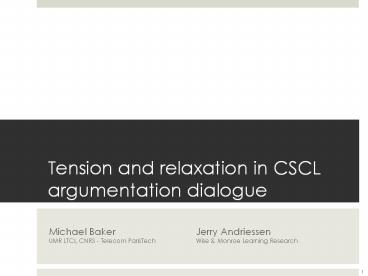Tension and relaxation in CSCL argumentation dialogue - PowerPoint PPT Presentation
1 / 28
Title:
Tension and relaxation in CSCL argumentation dialogue
Description:
Tension and relaxation in CSCL argumentation dialogue Michael Baker Jerry Andriessen UMR LTCI, CNRS - Telecom ParisTech Wise & Monroe Learning Research * – PowerPoint PPT presentation
Number of Views:101
Avg rating:3.0/5.0
Title: Tension and relaxation in CSCL argumentation dialogue
1
Tension and relaxation in CSCL argumentation
dialogue
- Michael Baker Jerry Andriessen
- UMR LTCI, CNRS - Telecom ParisTech Wise Monroe
Learning Research
2
Types of situations studied
- Video 1
- Video 2
3
Main objectives
Collaborative learning?
?
Computer-mediation
Interactions between students
The cognitive dimension processes of
co-elaboration of understanding and knowledge
The social dimension of dynamics of
interpersonal relations
Argumentation dialogue
Tool-appropriation
4
Plan
- Research background
- A case study
- Questions and perspectives
5
1. Research background
6
The cognitive and the social in collaborative
learning research
1- Research background
- The social as a leftover of the cognitive
- The social as a variable socio-cognitive
conflict - Peer interaction leads to stable cognitive
progress not attributable to repetition of
correct responses - Sociocognition two sides of the same coin
- research paradigms built on supposedly clear
distinctions between what is social and what is
cognitive will have an inherent weakness, because
the causality of social and cognitive processes
is, at the very least circular and is perhaps
even more complex - it is no longer possible to decide a priori if
a competence is purely cognitive or also involves
the social competence of displaying that
behaviour. Intelligence, then can be considered
as intrinsically a sociability. (Perret-Clermont
et al. 1991, p. 50)
7
The collaborative working relation (van de Puil
Andriessen)
1- Research background
- Motivation
- Groups struggle to find balance between the need
to accomplish their work, and desire to achieve
harmonious interpersonal climate - Efficient group eobjectives gt egroup maintenance
- Dimensions
- Ontological perception of knowledge as a
dynamically developing, subjective, and
preliminary construct - Procedural belief, motivation, and ability to
take responsibility for the process of learning
and shaping learning interaction - Relational appreciation of peer(s) and the self
as valued contributors to the collaborative
process and to knowledge - Criteria (Allwood)
- cognitive consideration, joint purpose, ethical
consideration, trust
8
Our approach to the CWR
1- Research background
- Apprehending the collaborative working relation
in terms of tension-relaxation - In conjunction with cognitive, structural and
logical features of dialogue
9
Bales (1950) Interaction process analysis
1- Research background
10
Facework in arguing (Muntig Turnbull)
1- Research background
- T1 - A CLAIM
- T2 - B DISPUTES T1-A CLAIM
- 1. Irrelevancy claim most aggressive
- 2. Challenge
- 3. Contradiction
- 4. Counterclaim least aggressive
- T3 - A
- Either, DISAGREES T2-B DISPUTE
- 1. Irrelevancy claim, 2. Challenge, 3.
Contradiction, 4. Counterclaim - Or, SUPPORTS T1-ACLAIM
- The more T2 damages As face, the more likely A,
in T3, will SUPPORT own T1 CLAIM - Facework is a major determinant of regularities
(cf Barth Krabbe, choice of argumentative
strategy, counteractive or direct defense)
11
Tension-relaxation in Western tonal music
1- Research background
12
Appropriation of CSCL technologies
1- Research background
- Distance modifies the social relation
- Interactive, (a)synchronous, tool-mediated,
multisemiotic communication transforms the
intercognitive - In many CSCL situations, students must
appropriate the tools whilst, as a means to,
learning - Appropriation as an inherently open, not totally
predictable process, of détournement of the tool,
instrumentalisation (hybrid cognitive-technical
action schemas Rabardel) - How does tool appropriation transform the
articulation between the social and the cognitive?
13
2. Case study
- SCALE project
- Computer-mediated interaction (CHAT)
- Debate in school on GMOs
14
SCALE and CABLE
2- Case study
Arguing to learn argumentative knowledge
15
Question
2- Case study
T/R
??
Deepening debate
16
Main analysis categories
2- Case study
17
Corpus extract (1)
2- Case study
18
Corpus extract (2)
2- Case study
19
Corpus extract (3)
2- Case study
20
Corpus extract (4)
2- Case study
21
T-R/B-D relations in the extract (1)
2- Case study
22
T-R/B-D relations in the extract (2)
2- Case study
23
(No Transcript)
24
Interrelations
T/R
Deepening debate
25
3. Questions, perspectives
26
Questions
3- Questions, perspectives
- What is a good T-R management process, for
collaborative learning? - How can tension-relaxation be measured?
- How can analysis of tension-relaxation be
validated? - Contextuality of analysis of tension-relaxation
- If, a priori, a light-hearted remark reduces
tension, in high-tension contexts it can also
throw oil onto the fire ! - The effect will depend on the T-R history,
amplitude of change - Conflict on the level of the interaction genre
- Refusal to fight, intentional blocking of
empathy
27
What next?
3- Questions, perspectives
- Try to answer the questions
- Refine analysis categories
- Combining researcher and first-person
perspectives? - Physiology? (!)
- Much broader corpus analysis to try to identify
regularities in the relations between T-R and
argumentative depth, between social and cognitive
conflict - A new collaborative research project
28
Reference
- Andriessen, J., Baker, M. van der Puil., C. (à
paraître). Socio-cognitive tension in
collaborative working relations. In Ludvigsen,
S., Lund, A., Rasmussen, I. Saljo, R. Learning
across sites new tools, infrastructures and
practices. London Routledge. - michael.baker_at_telecom-paristech.fr































